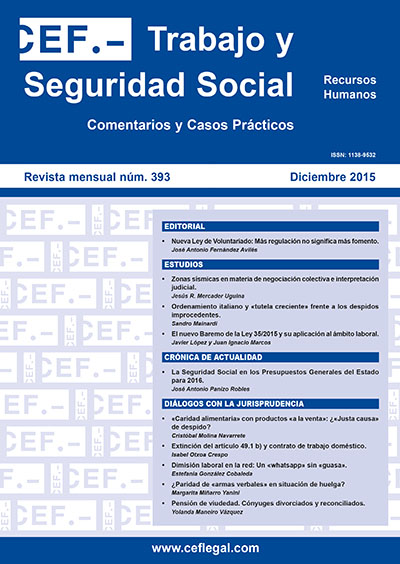Italian law and «increasing protection» against unfair dismissal
DOI:
https://doi.org/10.51302/rtss.2015.2764Keywords:
Italian labour law reform, unfair dismissal, wrongful dismissal, redundancy payment, lump-sum compensationAbstract
This article analyzes the reform of the Italian discipline of dismissals, introduced by Legislative Decree no. 23/2015. This important change in employment law was decided by the Italian Government on the basis of Law no. 183/2014. This new Legislative Decree applies only to employees hired after its entry into force, so that the future dismissals from employment relationship began prior to the reform will be governed by the previous legislation including Article 18 of Law no. 300/1970 (the famous Statuto dei Lavoratori). In particular, Legislative Decree no. 23/2015 changed the rules on sanctions applicable to employers in all kinds of unlawful dismissal: discriminatory dismissals or otherwise null; inadequately motivated disciplinary dismissals; dismissals unlawfully motivated by reasons related to the individual employee (e. g. for sickness absence that had not exceeded the legal limits); individual and collective dismissals in overstaffed businesses, crisis or receivership procedures. The most important innovations consist in a sharp reduction of the sanctions for unlawful dismissals of employees hired by employers with more than fifteen employees. Before this reform, in several cases of unlawful dismissal, employees were entitled to reinstatement in the workplace and in the remaining cases were entitled to a lump-sum compensation of an amount specified by the Court and still high (12 to 24 months' salary). According to the Legislative Decree no. 23/2015, instead, the reintegration into the workplace is no longer the general rule, but it is an exception applicable only in case of discrimination, in other cases of nullity of the dismissal and in few cases in which the disciplinary dismissal was motivated on the basis of an accusation based on non-existent facts. In all other cases of unlawful dismissal, including all cases of dismissal for economic reasons, the employee is entitled only to a lump-sum compensation for damages equal to two months' salary for each year of duration of the employment relationship, with a minimum of four months' salary for employment relationships of less than two years and a maximum of twenty-four months' salary for relationships lasted more than twelve years (actual average amounts will be probably lower, as was also introduced a partial tax incentive in order to encourage to reach a dispute settlement before the beginning of Labour Court trials). After offering an overview of Legislative Decree no. 23/2015, the author analyzes the main difficulties in the interpretation of the new rules, and finally concludes that this very significant reform appears a continuation of employment law reforms of recent years, since it aims to protect employers more in the labour market rather than in the employment relationship, and because it reduced the discretionary power of Labour Courts.
Downloads
References
Carinci, F. [2015]: Il tramonto dello Statuto dei Lavoratori (dalla l. n. 300/1970 al Jobs Act), ADAPT Studies e-book series, núm. 41.
Chieco, P. [2013]: «Il licenziamento nullo», en Chieco (dir.), Flessibilità e tutele nel lavoro. Commentario della legge 28 giugno 2012, núm. 92, Bari.
De Luca, M. [2015]: «Contratto di lavoro a tutele crescendi e sistema sanzionatorio contro i licenziamenti illegittimi», Lav. Giur.
Garilli, A. [2015]: «Nuova disciplina dei licenziamenti e tecniche di prevenzione del conflitto», Rivista Italiana di Diritto del Lavoro, núm. 2.
Ichino, P. [2012]: La riforma dei licenziamenti e i diritti fondamentali dei lavoratori, Milano.
Mainardi, S. [2015]: «Il campo di applicazione del D.Lgs. n. 23/2015: Licenziamenti illegittimi, tutele crescendi e dipendenti pubblici», in F. Carinci y C. Cester, Il licenziamento all'indomani del D.Lgs. n. 23/2015, ADAPT Studies e-book series, núm. 46.
Marazza, M. [2015]: «Il regime sanzionatorio dei licenziamenti nel Jobs Act», en WP CSDLE «Massimo D'Antona», it - 236/2015, 21.
Tremolada, M. [2015]: «Il campo di applicazione del d. lgs. 4 marzo 2015, n. 23», en F. Carinci, y C. Cester, : Il licenziamento all’indomani del D.Lgs. n. 23/2015, ADAPT Studies e-book series, núm. 46.
Zoli, C. [2015]: «I licenziamenti per giustificato motivo oggettivo dalla legge n. 604 del 1966 al D.lgs. n. 23 del 2015», en G. Ferraro (dir.), I licenziamenti nel contratto a tutele crescendi, Quaderni di Arg. Dir.



















